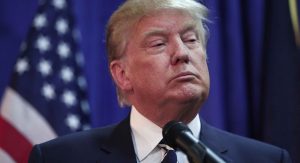 President Trump has announced that a 25 percent tariff on imported steel and a 10 percent tariff on imported aluminum would be imposed by his administration. A tariff is a tax placed on a particular class of imported goods. The new tariffs are reportedly set to go into effect next week. Specific details of the policy have yet to be released.
President Trump has announced that a 25 percent tariff on imported steel and a 10 percent tariff on imported aluminum would be imposed by his administration. A tariff is a tax placed on a particular class of imported goods. The new tariffs are reportedly set to go into effect next week. Specific details of the policy have yet to be released.
Under the new tariffs, a company bringing $100,000 of steel into the country would have to pay an additional $25,000 to the government. The tariff would not apply to domestic production. The United States imports only about one-third of its steel, but only 10 percent of the aluminum used in this country is made domestically.
The tariffs are being imposed on the grounds that other countries’ trade practices are endangering American national security by undermining domestic production. Chinese state subsidies that encourage production have flooded the global marketplace with metals, depressing prices and making American production less competitive in the global market. American steel and aluminum companies have long complained of unfair practices by overseas competitors.
This is not the first time this tactic has been tried. The George W. Bush administration made a decision to impose steel tariffs of up to 30 percent in 2002. The Bush administration steel tariffs have since been judged to have been very expensive relative to the jobs that were saved.
The big winners of the new tariffs would be the United States steel and aluminum industries, while the losers would include every industry that relies on steel and aluminum as part of their products, which are a considerably larger share of the United States economy. It is hard to predict whether the producers of those products will eat the cost of more expensive metals or pass the cost on to consumers in the form of higher prices.
China and other nations may now be willing to use national security concerns as grounds for tariffs after President Trump’s action. Affected countries may retaliate by ordering tariffs on American goods, imperiling U.S. exports and jobs. This dynamic was reflected in the stock market after President Trump’s announcement. Shares of U.S. Steel and Century Aluminum each rose about 7 percent shortly afterward, while shares of Ford, Caterpillar and Boeing each fell about 3 percent.
